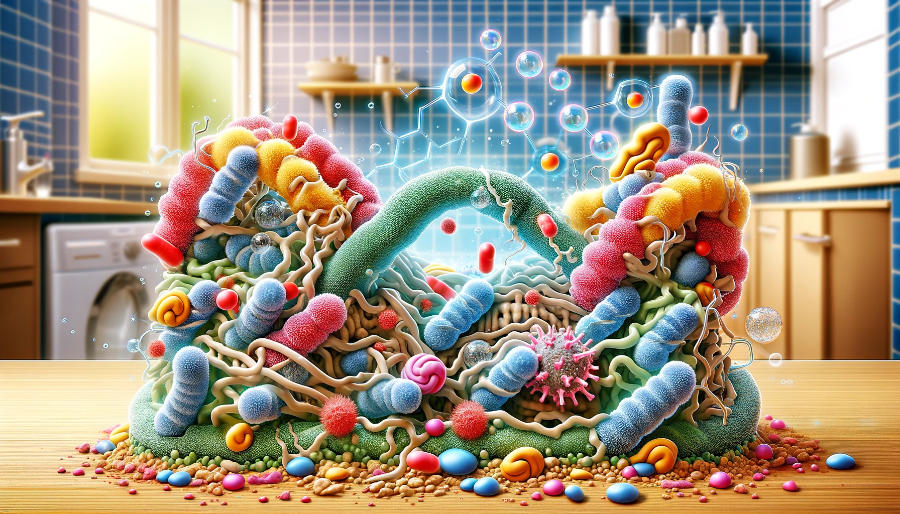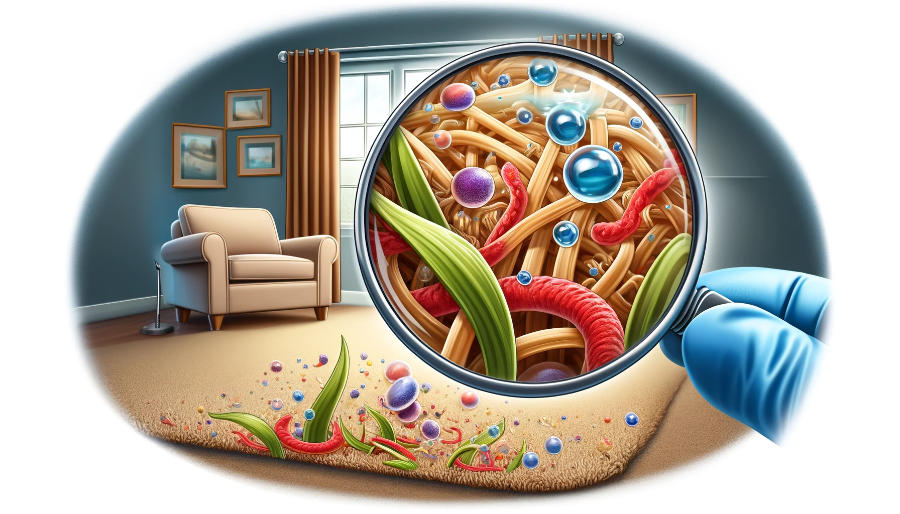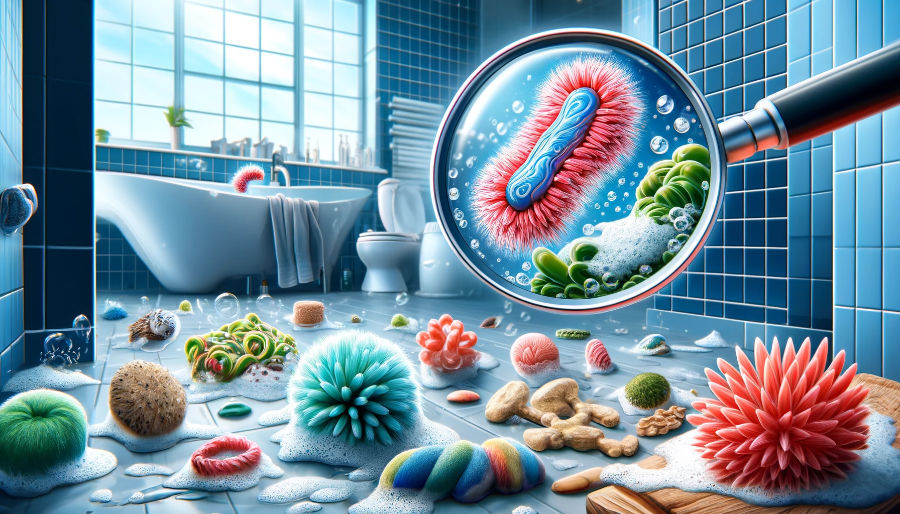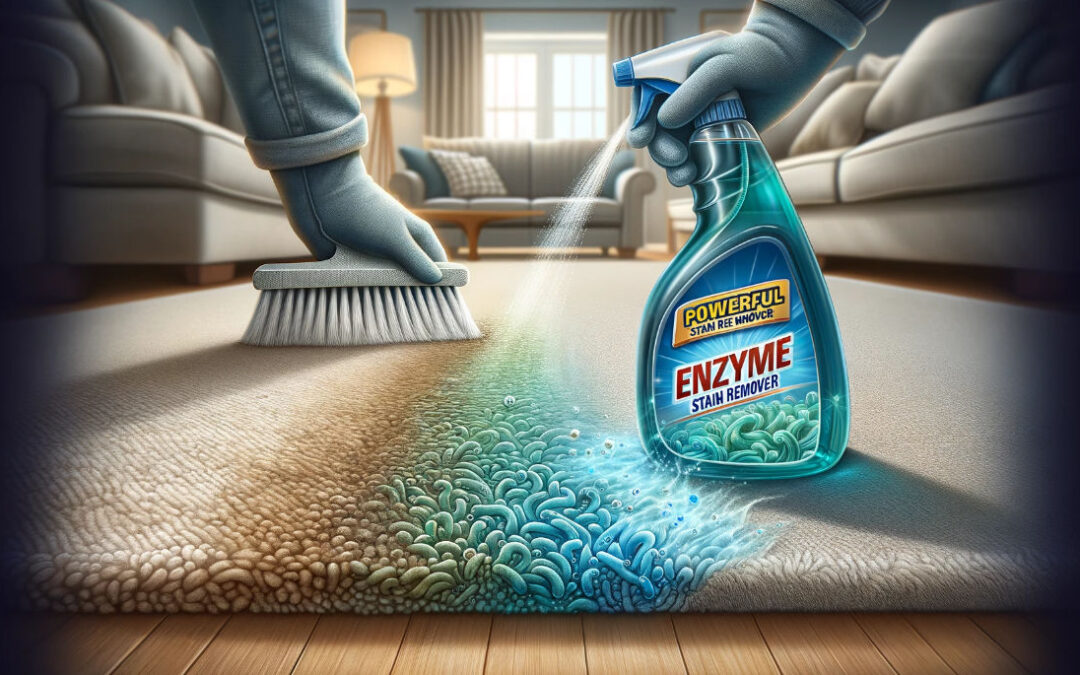While traditional chemical cleaners have been the go-to for decades, there’s a powerful, natural alternative that’s gaining popularity: enzyme-based cleaners. These innovative products harness the power of enzymes to effectively break down stains and odors, providing a safer and more eco-friendly cleaning solution.
But what exactly are enzymes, and how do they work their magic in cleaning products?
Enzymes are biological molecules, typically proteins, that act as catalysts to accelerate chemical reactions. They are found naturally in all living organisms and play crucial roles in various biological processes.

How Do Enzymes Work In Cleaning?
Enzymes are proteins made by living cells in plants, animals, and bacteria. In nature, they help break down waste.
When we use enzyme cleaners, these enzymes quickly start breaking down dirt, grease, and oil. They target the proteins and fats that hold these substances together, making it easy to wash them away completely.
Enzymes act as natural catalysts, speeding up the process of breaking down organic materials, which make up most household dirt and grime. They dissolve and eliminate protein and organic matter, removing odors from things like urine, feces, vomit, spoiled food, and mildew.
Here’s a simple experiment to see how enzyme cleaners work: Mix warm water with an enzyme cleaner and pour it into a cup. Add a few pieces of dry cat food. In about 10 to 15 minutes, the cat food will dissolve completely. This shows how enzymes break down proteins, just like they do with stains and odors in your home.
There are several types of enzymes commonly used in cleaning products, each targeting specific types of stains:
- Proteases: Break down protein-based stains such as blood, food, and sweat.
- Amylases: Target starchy stains, including sauces and gravies.
- Lipases: Effective against greasy and oily stains.
- Cellulases: Help remove dirt and improve fabric softness by breaking down cellulose fibers.

Enzyme Cleaners For Carpets and Fabric
Blood Stain Removal:
Blood stains are notoriously difficult to remove because they contain proteins that bind tightly to fabrics and surfaces. Enzyme cleaners, particularly those with proteases, are specifically designed to break down these proteins, making it easier to lift the stains.
For example, we recently had a client who struggled with persistent blood stains on their carpet after a bad nosebleed from dry air. Our team applied an enzyme cleaner directly to the affected area, allowing it to sit and penetrate the stain.
After a short period, the enzymes broke down the blood proteins, and we were able to easily remove the stain with a regular carpet cleaner, leaving the carpet spotless.
Eliminating Organic Odors In Fabric:
Enzyme cleaners are also highly effective in reducing and eliminating odors caused by organic materials such as urine, vomit, and other biological substances. These odors can be particularly challenging because they often penetrate deep into fabrics and carpets, making them hard to eradicate with traditional cleaners.
For instance, we were called to a pet owner’s home where their dog had multiple accidents on the carpet, leaving behind strong urine odors.
We used an enzyme-based cleaner designed for pet stains and odors, which contains a blend of enzymes that target the uric acid crystals found in urine. We sprayed the enzyme cleaner generously over the affected areas, ensuring it reached the carpet backing where the odor was most concentrated.
Enzyme cleaners are gentle enough for use on upholstery, effectively removing food stains, pet accidents, and other organic matter without damaging the fabric.

Using Enzyme Cleaners In Bathrooms
Soap scum is a common problem in bathrooms, forming a stubborn, filmy layer on shower doors, tiles, and tubs. Traditional cleaners often require harsh scrubbing and strong chemicals to remove soap scum.
Enzyme cleaners, on the other hand, use specific enzymes to break down the fats and oils in soap scum, making it easier to wipe away.
For example, we recently cleaned a client’s shower that had a thick buildup of soap scum on the glass doors. We applied an enzyme-based cleaner, allowing it to sit for a few minutes. The enzymes broke down the fatty components of the soap scum, allowing us to effortlessly wipe away the residue, leaving the glass sparkling clean without the need for abrasive scrubbing.
Mildew is another common issue in bathrooms, especially in damp areas like showers and around sinks.
Enzyme cleaners can break down the organic matter that mildew feeds on, effectively eliminating it and preventing regrowth. We treated a bathroom with significant mildew growth around the grout lines of the shower tiles.
After applying an enzyme cleaner and letting it work, we saw a noticeable reduction in mildew, which we then easily rinsed away.
If you’re seeking reliable cleaning pros for your facility, call us today to discuss details and obtain a quote.

